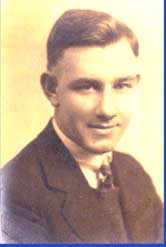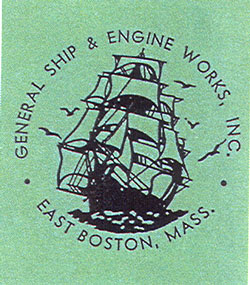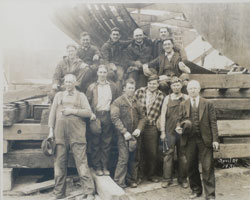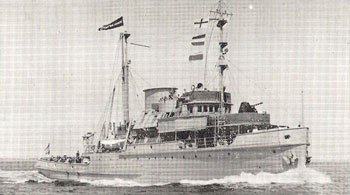
| Homepage |
| Early Life |
| Building a Family |
| A Special Home |
| Shipbuilding Career |
| The "Mount" |
| Memories |
| Flash Movie |
| Contact |
| Credits |
| Photo Album |

The difficult years of the Depression had begun, and despite the hard times, Hedblom had resigned from his job at Bethlehem Steel (the company which had taken over Atlantic Works) following a dispute with company management. He and his father began looking for space in East Boston to use as a machine shop. They spotted a vacant space in the old Bertelsen & Petersen yard where they had worked for many years. An appointment was made with Mr. Bertelsen - and following a pleasant visit, an agreement was reached allowing the Hedbloms to use the property rent free until they turned a profit. Their company - General Ship & Engine Works was formed the very next week. Soon the General Ship & Engine Works had its first major client. In December 1932, the Hedbloms were asked to convert the burned-out hull of the old Boston Floating Hospital into a coastwise oil tanker. Fire had destroyed the boat during the winter - luckily when no patients were aboard. Behind the commission was D.K. Ludwig, who later became a famous shipping magnate and one of the world's richest men. In 1933, the ship was relaunched as a 675 gross ton diesel-powered tanker, named Marshall B. Hall. (Byron Hedblom's personal account of the conversion) Around this time, the Hedbloms hired two men who would be important members of the team at General Ship & Engine Works - Arnold Nielsen and Carl Roessler. Carl, a Woburn neighbor, would marry Byron's sister Ruth in 1934, and become the company's Works Manager.
The Streamline Ferries One morning in 1935 Byron Hedblom found on his desk an urgent request to submit a set of plans for two ferries to be built in Vermont on Lake Champlain for Mr. Horace Corbin. Several days later, Hedblom took the train to Grand Isle, Vermont, where Corbin, owner of the Champlain Transportation Company lived. (Read Byron Hedblom's account of this meeting in snowy Vermont ). A contract to do the work was signed right in the midst of the Great Eastern Blizzard of 1936. All transportation halted and the electricity went out. Lake Champlain rose by eight feet.
The weather made the Hedbloms somewhat concerned about conditions for construction of the ferry, but they moved to Burlington and began work. Byron and Doris's second daughter, Janet, was born there while work was under way on the project.
A New Home for General Ship In late 1936, Paul Bertelson came to see Carl and Byron Hedblom to tell them he needed to considerably raise the rent on the shop. A deal could not be reached, and General Ship & Engine Works learned that they would have to vacate the premises within 30 days. With several important contracts pending, the Hedblom Father-Son team had to move fast. They purchased a waterfront property on Border Street in East Boston consisting of a large piece of land with two wharves and no buildings except a three-story dwelling. A short time later, old pilings were uncovered which led to the discovery that the shipyard's new home had an illustrious hitory. It had once been the home of Donald McKay's shipyard where the great Clipper Ships like the Flying Cloud were built. "When the newspapers got wind of this fact, they gave a great deal of publicity about the rejuvenation of the Donald McKay shipyard," Hedblom later recalled. Boston General Ship & Engine Works adopted the image of a Clipper Ship as its logo. New York Electric Ferries In 1937, General Ship & Engine Works successfully competed for a contract with General Motors Corp to build the New York Electric Ferries. The two ferries were outfitted with General Motors engines, and were completed in 1942. Boston Mayor Maurice Tobin, attended the laying of the keel ceremony for the ferry "Hudson" and welded his name on the ship's keel. - Read More on the New York Electric Ferries page. The Mount Washington In 1939, over the Christmas Holidays, the famous old side wheel steamer Mt. Washington burned at the dock at the Weirs, Laconia, New Hampshire. The Captain, Leander Lavallee contacted General Ship & Engine Works about building a replacement ship. Read More on the Mount Washington pages.
The V-4 Tugs In 1941, General Ship and Engine Works received an invitation from the U.S. Maritime Commission to come to Washington to receive plans and specifications for the construction of five super ocean going tugboats. These were to be part of a group of 50 tugs built in ten different yards as part of the war effort. The General Ship & Engine Works bid was successful, and the company was granted a large contract that required larger facilities and more staff than they currently had.
Extras: |
 The Birth of The General Ship & Engine Works
The Birth of The General Ship & Engine Works 

